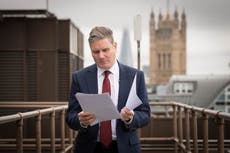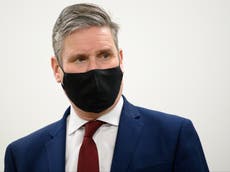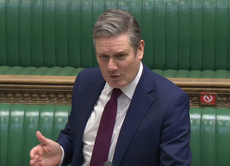The fight over who will be Keir Starmer’s next shadow chancellor has begun
There is jockeying in the Labour Party to replace Anneliese Dodds in the top economics portfolio

Your support helps us to tell the story
From reproductive rights to climate change to Big Tech, The Independent is on the ground when the story is developing. Whether it's investigating the financials of Elon Musk's pro-Trump PAC or producing our latest documentary, 'The A Word', which shines a light on the American women fighting for reproductive rights, we know how important it is to parse out the facts from the messaging.
At such a critical moment in US history, we need reporters on the ground. Your donation allows us to keep sending journalists to speak to both sides of the story.
The Independent is trusted by Americans across the entire political spectrum. And unlike many other quality news outlets, we choose not to lock Americans out of our reporting and analysis with paywalls. We believe quality journalism should be available to everyone, paid for by those who can afford it.
Your support makes all the difference.The muffled sound of breaking china coming from deep inside No 10 is distracting the Westminster village from a power struggle across the road. While the sudden elevation of David Frost to the cabinet and the departure of Oliver Lewis, his former deputy Brexit negotiator, have been all too visible, the jockeying for position in the shadow cabinet has been less conspicuous.
Yet there is something significant going on in the Labour Party, brought into focus by Keir Starmer’s speech on the economy on Thursday, which was hyped in advance as a major policy event. When the speech was actually delivered, its new policy – a British Recovery Bond – fell flat and has already disappeared without trace. Neither the economics nor the politics commentators could see the point of it, and it failed to live up to the windy rhetoric about “a future that’s going to look utterly unlike the past”.
Given that the policy was the product of the partnership at the top of the party between Starmer and Anneliese Dodds, the shadow chancellor, and given that Starmer’s position is not in question, it means that of Dodds may well be.
Shadow cabinet ministers noticed a column by Anne McElvoy in the Evening Standard last week, which said that “both Starmer and Dodds project anxiety”, when the voters are looking for competence with confidence. Dodds has a “forensic, academic mind”, said McElvoy, but she makes economic policy “boring, and most politics demands retail skill”. The article ended with “friendly advice to the too-shadowy chancellor: step up or step away”.
The surest sign that Dodds may not be in the post much longer is that the contenders to replace her are vying for the attention of the leader and the wider party. Ed Miliband, the shadow business secretary, seems to think that he and Starmer would make a good co-leadership. Miliband helped get Starmer into the House of Commons at the 2015 election, and as a former leader he has the confidence to handle big parliamentary occasions and television interviews.
He was on the The Andrew Marr Show two weeks ago, previewing some of the themes of Starmer’s speech: “We can’t just carry on with business as usual. We’re talking today about supporting businesses. There needs to be a new relationship between government and business.”
The next day, Rachel Reeves, an economist who used to work for the Bank of England, whose front bench role is to shadow Michael Gove’s shrinking empire at the Cabinet Office, delivered a long speech on cronyism in government contracts. Since then she has pursued that rich theme daily, assisted by yesterday’s court ruling that Matt Hancock had broken the law by failing to publish the details of PPE contracts awarded without competition.
Meanwhile, Lisa Nandy, the shadow foreign secretary, wrote an article for Politico on Thursday, ostensibly on foreign policy but actually about economics. It argued that the UK needs a fiscal stimulus to “go big on jobs”, as Joe Biden has done in the US.
And Yvette Cooper, chair of the Home Affairs Select Committee, and overlooked by Starmer when he assembled his shadow cabinet 10 months ago despite her economics MSc, has also promoted herself. Yesterday she shared a video of her and Ed Balls, her husband, holding a mock inquest into her advice that he make light gravy for Celebrity Best Home Cook – which he won, despite Mary Berry saying she would have preferred a dark gravy. Cooper has been good as select committee chair in holding Boris Johnson to account over border controls, and this video showed there is another side to her stern and serious public persona.
So who will Starmer choose? It is unlikely to be Miliband. That would be too much like refighting the 2015 election, and I understand that Starmer feels Miliband would not fit well with his ambition to present Labour as a party on the side of business. Miliband’s talk when he was leader of businesses as “predators” has marked him, especially when he seemed to think Jeremy Corbyn’s relative success in 2017 suggested that he should have gone further in that direction. Besides, the party would resist having two white men from north London in the top two posts.
In his speech on Thursday, Starmer tried to associate Johnson and Rishi Sunak with the entire period of Conservative government since 2010; but he has an equally urgent need to move on not just from the Corbyn era but from the Miliband era too.
That suggests keeping Dodds where she is; replacing her with Reeves, Nandy or Cooper; or finding someone else. It might be thought that what is most important is getting the economic policy right, but this week’s flatpack assembly of platitudes suggests that what might matter more is avoiding getting the policy wrong. Once the British Recovery Bond has been binned, Starmer needs to decide who can best sell an economic policy that doesn’t strain to be bold, radical and “utterly unlike the past”. He needs someone who can project confidence, competence and a good understanding of basic economics. This is an important choice that – unlike the squabbling in No 10 – could decide the next election.





Join our commenting forum
Join thought-provoking conversations, follow other Independent readers and see their replies
Comments